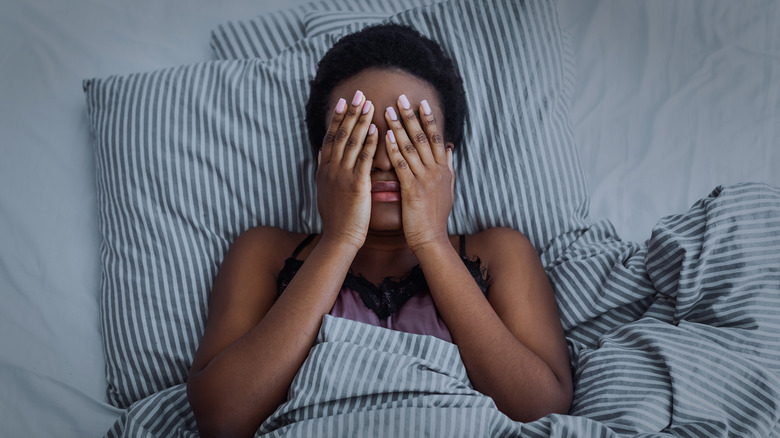Many people turn to melatonin as a natural sleep aid if they find themselves spending long stretches of the night tossing and turning. After all, melatonin is a hormone already produced in our bodies, per The National Center for Complementary and Integrative Health. Melatonin production takes place in the brain and is linked to our day-night cycle, also known as our circadian rhythm. Johns Hopkins Medicine recommends taking between 1 and 3 milligrams of a melatonin supplement for best results.
Some individuals might start taking melatonin and not notice a difference in the length of time it takes to fall asleep nor in their ability to stay asleep. If this happens to you, there could be several explanations, as per Mindbodygreen. One of these reasons is related to overall stress levels. Sleep expert Jacob Teitelbaum explains, “If adrenal stress hormones are too high at bedtime, it will keep your mind racing, making it difficult to sleep.” In this case, melatonin might not be able to override the stress.
Another potential reason melatonin isn’t working for you is if you have been taking it long-term (per Mindbodygreen). The body adapts to the melatonin supplement over time, causing it to stop working. This is why melatonin is best for short-term issues, rather than chronic sleep disturbances. One last reason you may not be having success with melatonin is if you aren’t sleeping during normal night hours, as can happen in the case of night shift work.
If you’re experiencing insomnia, try this instead

Cleveland Clinic points out that around 70 million Americans experience insomnia each year, while chronic insomnia disorders affect between 10 and 15 percent of the population. A 2024 study published in the Journal of Family Medicine and Primary Care also found that incidences of insomnia increase with age and can be linked to comorbidities such as diabetes. While melatonin can be a solution for short-term symptoms of insomnia, as per WebMD, it may not work long-term. It can also prove ineffective in certain individuals. If you’re not noticing an improvement in your sleep after supplementing with melatonin, there are a few other things you can try.
Medical News Today points out that exercise is a powerful way to combat insomnia. A 2024 trial in the Journal of Sleep Research found that 150 minutes of exercise per week significantly improved insomnia symptoms. Meditation is another way to stave off insomnia as the practice helps you still your mind, which can reduce your stress levels and racing thoughts. Moreover, the American Academy of Sleep Medicine outlines progressive muscle relaxation as a way to calm your body for sleep.
You can also experiment with natural sleep supplements such as valerian root, magnesium, and chamomile, all of which have been linked to increased sleepiness (via Medical News Today). Lastly, proper sleep hygiene is key, which includes avoiding bright screens before bed and going to bed and waking up at the same time every day.

